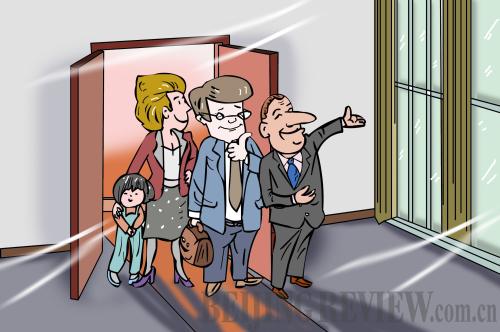|
 |
|
(LI SHIGONG) |
Canadian real estate developers said that the flowing in of Chinese money will keep housing markets stable in Vancouver. The city was recently ranked the second least affordable in the world by Demographia's International Housing Affordability survey.
Colin Bosa, CEO of Bosa Properties, said that as long as the Chinese continue to move to British Columbia, markets will remain stable.
"They like it in British Columbia because it's safe and they're accepted here," Bosa said. "There is a good quality of life with universal health care and good schools."
Vancouver is British Columbia's largest city and known for hosting the 1986 Expo, 2010 Winter Olympics, its beautiful natural scenery, sky-high housing prices and its massive multi-ethnic population.
The 2011 census of Canada found that although China has slipped behind the Philippines as the country's top source of immigrants, Chinese languages accounted for 40 percent of Vancouver's immigrant languages spoken. The city even has a nickname, Hongcouver, because of its large, primarily Cantonese-speaking population.
An empty pit lies along No. 3 Road, a main artery in Richmond, a city in the Greater Vancouver area. It will soon be the construction site of two new condominium towers, the Mandarin Residences, which will be completed in the summer of 2015.
While Rennie Marketing Systems, the Mandarin's sales partner, has largely promoted the development as a location of convenience by the SkyTrain station, its name fits right in with the backdrop of Chinese shop signs and Bank of China branch a block away.
The name, agent Diana Wang defends, has nothing to do with targeting the Chinese market. "It was because of the result of the census," she says. "Richmond is a Mandarin-speaking population."
Units have been snapped up quickly with over 300 of the 348 in the development already sold as of January 2013. Sales only began in late April 2012, meaning more than one unit has been sold each day since sales have opened to the public.
Wang estimated that over 90 percent of the units sold went to Chinese buyers, ranging from the wealthy buying condos for their children sent abroad for post-secondary education, to those looking for an investment.
The Chinese Government has imposed limitations on real estate in several cities such as Beijing and Shanghai, allowing a one household to one property ratio due to the escalating housing prices and to curb the real estate bubble in its mega-cities. With many wealthy Chinese looking to make investments in property, but have reached limits within China, they turn to outside markets like Vancouver or California where plenty of Asian money is already invested.
However, fears of an over-dependency on Chinese investment are unfounded and likely only felt in a small number of markets, according to Brendon Ogmundson, British Columbia Real Estate Association economist. "Overall, the impact of Chinese investment in the Vancouver market is not insignificant, but is also not likely a main driver of activity."
"There is no data on foreign investment flows into Canadian real estate and so there is no hard evidence on the impact of foreign investment on the Vancouver housing market," Ogmundson explains. "Survey data tends to put foreign investment at a relatively small share of the market, maybe 3 to 5 percent but it is a small sample and so not much can be extrapolated from it."
The small share of the market hasn't deterred developers from marketing to Chinese investors though, especially those in the wealthy Richmond, West Vancouver, and West Side area.
Diana Wang walks around the showroom, touring an elderly couple. They stop at the miniature model and Wang points out the remaining available rooms with her laser pointer. "What about on the 10th floor?" they ask her in Chinese. "Yes, we still have some units available, this is 1006," she answers back without skipping a beat. The rest of the conversation carries on entirely in Chinese while in the background, Sales Coordinator Judy Hshieh is on the phone answering questions in Cantonese.
The author is a Canadian living in Beijing
Expats, we need your stories!
If you're an expatriate living or once lived in China and have a story to tell or an opinion to share about any aspect of life here, we are interested in hearing about it. We offer payment for published stories (700-900 words). Submissions may be edited.
Email us at: zanjifang@bjreview.com
Please provide your name, nationality and address along with your stories | 